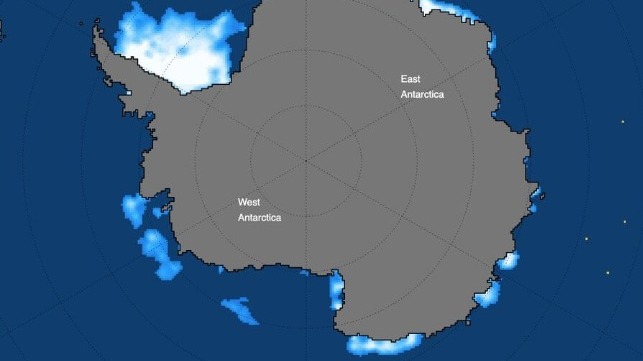Antarctic Seasonal Sea Ice Cover Hits Record Low

Antarctic sea ice cover has hit a record low level, according to Germany's Alfred Wegener Institute, and the melt season is not yet over. As of February 8, Antarctic sea ice cover stood at 850,000 square miles, the lowest extent in forty years of recordkeeping.
"Since the sea ice melting in the Antarctic will most likely continue in the second half of the month, we can't say yet when the record low will be reached or how much more sea ice will melt between now and then," said Prof. Christian Haas of the Alfred Wegener Institute's Helmholtz Centre. "The rapid decline in sea ice over the past six years is quite remarkable, since the ice cover hardly changed at all in the thirty-five years before."
Sea ice extent in #Antarctica is now the lowest since satellite observations began forty years ago. In early February, only 2.20 million square kilometers of the Southern Ocean were covered by #seaicehttps://t.co/YIoTBKDqn6
— AWI Media (@AWI_Media) February 10, 2023
????@meereisportal pic.twitter.com/bkvpHgE3UJ
Sea ice melt-off does not not affect sea level, since the ice is already afloat, but the seasonal ice normally provides a protective buffer for the edges of Antarctica's massive glaciers. Its absence exposes the seaward face of glaciers and ice shelves to erosion from wave action, accelerating calving.
The melt-off is most pronounced along West Antarctica's coastline, where the Bellingshausen Sea is almost ice-free for the first time in memory. The lack of sea ice has been convenient for the German research vessel Polarstern and her crew, which have completed their latest Antarctic cruise. The conditions bore little resemblance to Ernest Shackleton's experience of the Antarctic summer season, according to the team.
"I have never seen such an extreme, ice-free situation here before. The continental shelf, an area the size of Germany, is now completely ice-free," said researcher Prof. Karsten Gohl, who has studied the area since 1994.

that matters most
Get the latest maritime news delivered to your inbox daily.
This year is exceptional, but it is part of a recent trend, according to the Institute. In the last eight years, the average ice extent in January has been below the mean level. On a longer time scale, Antarctic ice cover has declined at about 2.6 percent per decade.
The ultra-low ice extent this year could be caused by higher-than-average air temperatures off the west and east coasts of the continent, according to the institute's researchers. A cyclical, wind-driven upwelling of deep water from the Southern Ocean may also be causing sea-ice retreat - and may also be accelerating the melting of Antarctic ice shelves, which hold back the continent's massive glaciers.
